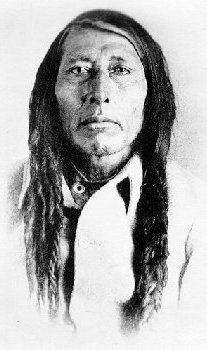 Pitikwahanapiwiyin (Poundmaker)
Pitikwahanapiwiyin (Poundmaker)
 Pitikwahanapiwiyin (Poundmaker)
Pitikwahanapiwiyin (Poundmaker)
Pitikwahanapiwiyin emerged as a political leader during the tumultuous years surrounding the extension of the treaty system and the influx of settlers into present-day Saskatchewan. Pitikwahanapiwiyin was recognized as a skilled orator and leader of his people by both Native and Non-native communities.
Born in about 1842 near Battleford in central Saskatchewan, Pitikwahanapiwiyin was the son of Sikakwayan, a Stoney shaman, and his Métis wife. Pitikwahanapiwiyin grew up with his Plains Cree relatives under the influence of his maternal uncle Mistawasis (Big Child), a leading figure in the Eagle Hill (Alberta) area. In 1873 Isapo-Muxika (Crowfoot), Chief of the Blackfoot, following a Plains Indian custom, adopted Pitikwahanapiwiyin to replace one of his own sons who had been killed in battle.
In August 1876 Pitikwahanapiwiyin, as headman of one of the River People bands, was influential enough to speak at the Treaty No. Six negotiations held at Fort Carlton. Pitikwahanapiwiyin emerged as one of the spokespersons for a group critical of the treaty. Though Treaty No. Six was amended to include a 'famine clause,' Pitikwahanapiwiyin continued to express concerns and agreed to sign the treaty on 23 August only because the majority of his band favoured it.
In the autumn of 1879, Pitikwahanapiwiyin, now chief, accepted a reserve and settled with 182 followers on 30 square miles along the Battle River about 40 miles west of Battleford. Frustrated by the government's failure to fulfill treaty promises, Pitikwahanapiwiyin became active in Indian politics: representing the Cree at inter-band meetings and acting as a spokesperson with the government. In July 1881 Pitikwahanapiwiyin acted as guide and interpreter during Governor-General Lord Lorne's trip from Battleford to Calgary. In June 1884, a Thirst Dance was held on the Poundmaker reserve to discuss the worsening situation of the Indians. By the middle of the month over 2,000 people had gathered. The Thirst Dance celebration was disrupted by the North-West Mounted Police pursuing an Indian accused of assaulting the farm instructor on an adjacent reserve. Violence between the Indian bands and the 90-man police force was averted by the peacekeeping efforts of Pitikwahanapiwiyin and Mistahimaskwa (Big Bear).
When news of the Métis success at Duck Lake reached the Poundmaker reserve in March 1885, Pitikwahanapiwiyin decided to utilize the unrest and fears of government agents to negotiate necessary supplies. Joined by the Stonies, the Cree went to Battleford. Arriving on 30 March, Pitikwahanapiwiyin and his people found the town deserted. Efforts to open negotiations with Indian Agent Rae failed. Hungry and frustrated, some of Cree and Stonies began looting the empty homes in the Battleford area, despite Pitikwahanapiwiyin's attempts to stop them. The next day the combined Battleford bands moved west to the Poundmaker reserve and established a large camp east of Cutknife Creek. Though Pitikwahanapiwiyin was appointed the political leader and chief spokesperson for the combined bands, a soldiers' lodge was also erected at the Cutknife camp. According to Plains Cree tradition, once erected the soldier's lodge, not the chief, was in control of the camp.
Lieutenant-Colonel Otter attacked the camp in the early morning of 2 May 1885. After seven hours of fighting, the Indians forced Otter to withdraw. At this point Pitikwahanapiwiyin stepped in and stopped the Indians from attacking the retreating troops. Following the Battle of Cutknife Hill on 2 May, Pitikwahanapiwiyin attempted to move the camp to the hilly country around Devil's Lake. The warriors leading the camp, however, prevented this retreat and began leading the combined tribes east to join Riel at Batoche. On 14 May, while passing through the Eagle Hills, the Battleford bands captured a wagon train carrying supplies for Colonel Otter's column. Once again Pitikwahanapiwiyin successfully intervened to prevent bloodshed and the twenty-one teamsters captured along with the wagons were taken prisoner.
Five days later the Battleford bands learned of the Métis' defeat at Batoche. Regaining control of the combined bands, Pitikwahanapiwiyin sent Father Louis Cochin to Major-General Frederick Middleton asking for his peace terms. On 26 May, Pitikwahanapiwiyin surrendered his arms and his followers at Fort Battleford. He was immediately imprisoned.
On 17 August 1885 Pitikwahanapiwiyin's trial on the charge of treason-felony began in Regina before Judge Richardson. Regarded as second in importance only to Riel's, the trial lasted for two days. After deliberating for half an hour, the jury returned a guilty verdict. Pitikwahanapiwiyin was sentenced to three years in the Stony Mountain Penitentiary in Manitoba. He served only one year before being released because of poor health. Four months later, while visiting his adopted father Isapo-Muxika on the Blackfoot reserve, he suffered a lung haemorrhage and died.